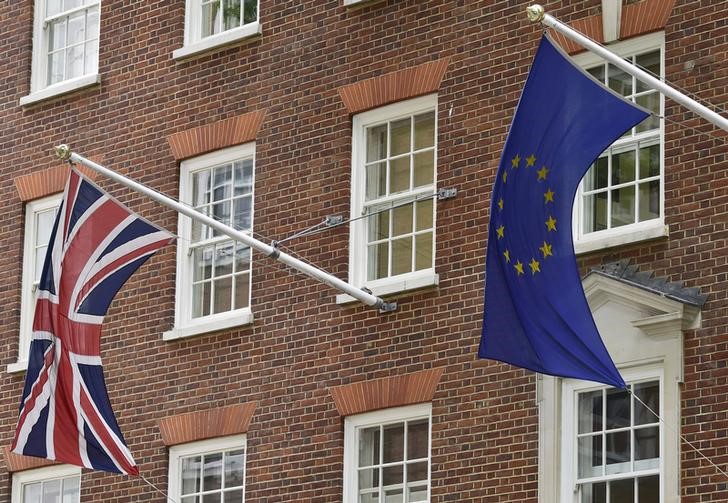By Guy Faulconbridge and Jamie McGeever
LONDON (Reuters) - A British exit from the European Union would gradually sap the world's financial capital of wealth and power but there would be no stampede of bankers and traders to rival centres, the City of London's policy chief told Reuters.
Prime Minister David Cameron, who won an unexpectedly decisive victory in a general election last month, has promised to renegotiate Britain's relationship with the 28-member EU and hold a referendum on membership by the end of 2017.
Some investors, chief executives and allies have warned that leaving the bloc would be politically and economically costly for Britain, whose economy is the world's fifth largest.
Marc Boleat, who is effectively the political leader of the historic financial district's municipal body, the City of London Corporation, said an exit vote would lead to years of 'divorce' negotiations during which London risked losing business.
"Brexit would lead to considerable uncertainty, with a threat if we could not get good exit terms of, over a period of years, the City of London being smaller than it otherwise would have been," he said in an interview.
"The question is not whether London is still a financial centre -- I can guarantee it will be in many years' time. The question is what size is it, are we getting bigger or smaller, are we getting more jobs?
"Over a period of years it would be a smaller centre than it otherwise would have been," Boleat said of the impact of leaving the European Union.
London dominates the $5.3-trillion-a-day foreign exchange market and is rivalled a financial capital only by New York.
Opinion polls -- which wrongly predicted a hung parliament in the May 7 election -- indicate British voters would vote to stay in the EU, a reversal from several years ago.
Boleat said the City wanted the British government to get assurances over the integrity of the single market and protection against discrimination for companies based in EU members such as Britain which chose not to join the euro.
"That is what we are most concerned about and what we would like the government to concentrate on in the negotiations that are about to happen. That is absolutely critical."
BANKERS IN CHAINS?
The Bank of England and many top financial services companies with operations in London are trying to assess what a Brexit would mean for their businesses.
Boleat said a Brexit vote would not "mean Goldman Sachs, or JP Morgan or Citi are going to say: 'Oh, close down.'"
"But it would mean ... as they have to take location decisions as leases come up, or they have to expand or contract, if it was more expensive to do business from London or if they couldn't do business from London, then over time there would be a move."
Boleat welcomed Britain's announcement on Wednesday of a clamp-down on abusive practices in financial markets, following a string of scandals and the global financial crisis.
"Banks have suffered significant damage to their reputation. But why should other institutions that had nothing to do with these scandals, why should the City of London's integrity as a whole be threatened because of 'X'?" Boleat said.
"We have a legal system in Britain that if you go and nick (steal) five quid from the garage till, you get banged up in prison, and if you nick 5 million by manipulating markets the chances are you won't be caught. And that has to change."
Proposals announced following the Fair and Effective Markets Review (FEMR) would extend criminal penalties for insider trading to Britain's huge fixed-income, currency and commodity (FICC) markets and lengthen jail sentences to up to 10 years.
FEMR was ordered by finance minister George Osborne a year ago after British banks were fined billions of pounds in 2013 for trying to rig Libor, a benchmark interest rate, and manipulate foreign exchange rates.
Boleat said the changes -- described by Bank of England Governor Mark Carney as signalling an end to "the age of irresponsibility" -- probably make it more likely that wrong-doers will be jailed.
But he warned against too much regulation, comparing the broad regulatory sweep across markets to rules forcing travellers to take off their shoes before boarding planes and preventing them from taking liquids on board.

"Tougher regulation has costs," he said. "By having much higher capital requirements on liquid asset holdings, liquidity in the financial system has sharply declined. And that is causing problems in financial markets. Was this intended?"